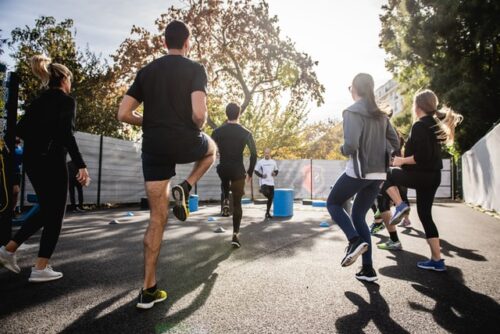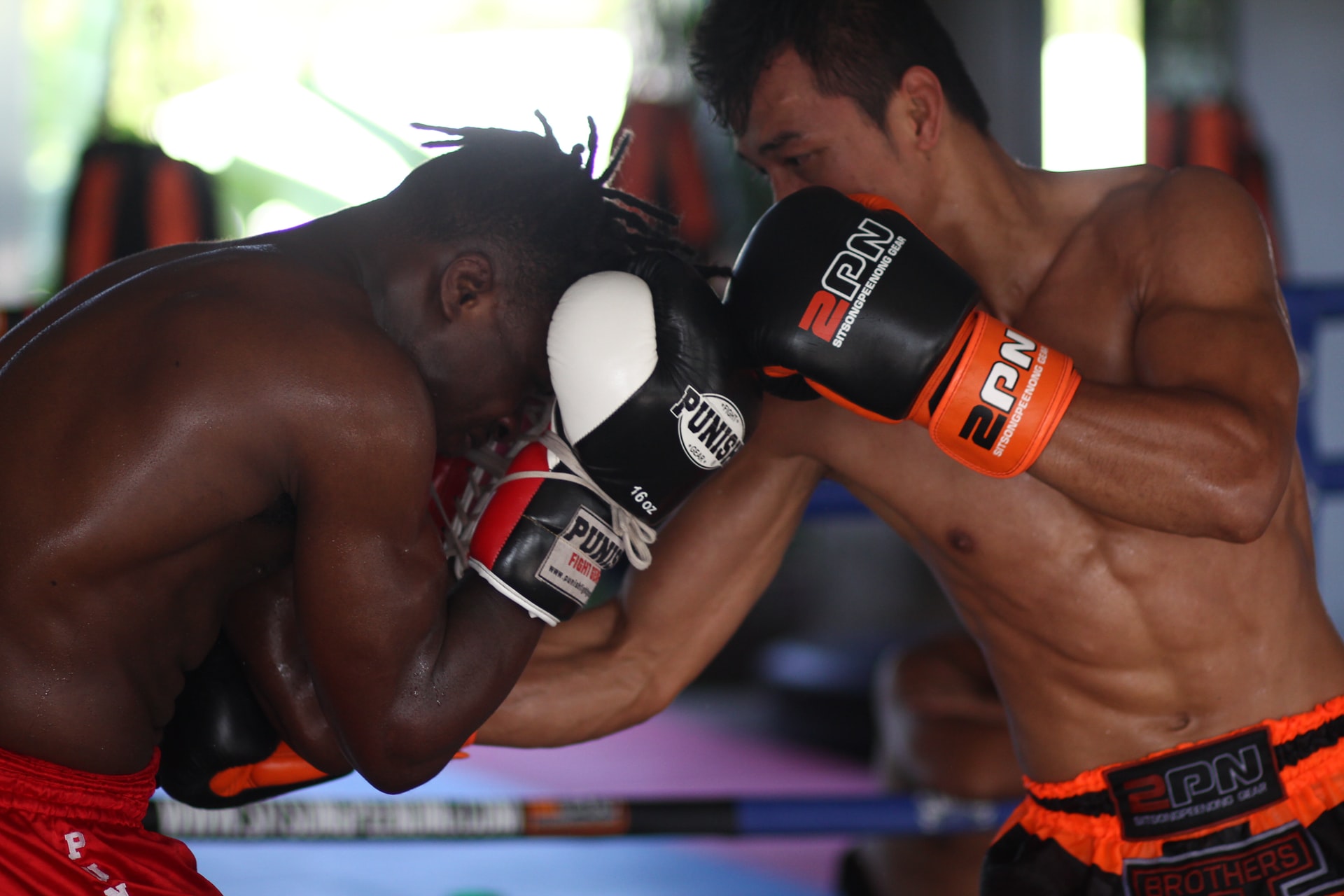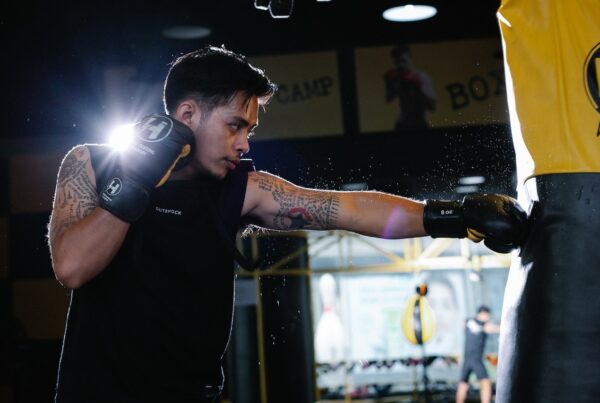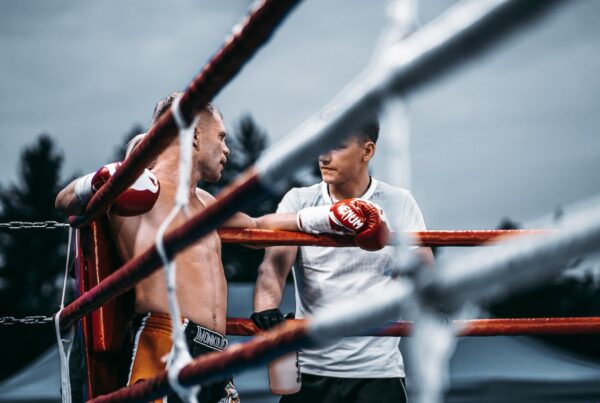Sparring can hurt and will inevitably hurt you when you receive an undefended strike. However, sparring should not cause any major injury – especially when done correctly under supervision. Getting a strike that hurts is part of any martial practise and will allow you to improve – you shouldn’t avoid it.
Sparring is a common training exercise in martial arts. It is usually done with padded weapons, such as sticks, swords or spears, and practitioners often use them to practice techniques and defend themselves against an opponent.
Some people (especially beginners) are afraid of sparring because it hurts or can cause them injury. This is partially true because sparring can be dangerous if not done right. However, sparring is extremely important in any martial arts and can quickly improve your skills.
What matters most is how you feel after practising sparring. If you find that it hurts your body then you should probably limit the amount of time that you spend practising this particular technique.
I was also afraid of sparring when I first started out. I remembered getting my first body shot – not only was it painful, it also made me lose all breath and buckled down. However, I started liking sparring after a few more sessions because it made me realise how quickly I was improving through sparring.
In this article, I will focus mainly on sparring and how to make sure your sparring is safe with limited damage. If you are a beginner and are afraid of sparring, this should be a perfect read.
Table of Contents
How Much Damage Does Sparring Do?
A typical sparring session should not cause any damage – provided that you are wearing your protective gear and is under supervision. That said, it is common for a sparring session to leave you with minor cuts, bruises, joint pain and swelling (if you landed your strike incorrectly).
It is extremely important to wear protective gear while sparring. These are commonly gloves, hand wraps, and mouths guards. In some martial arts like kickboxing, you could even spar using the chest for maximum protection.
I personally did not wear chest guard very often (more during the beginning because my gym provided it). In most of my boxing spars, I would at least wear mouth guard, gloves and hand wraps. I would wear a head guard sometimes if it’s available.
Personally, With these protective gears and coach supervision, I have never gotten major injuries. However, minor cuts and bruises are quite common. I am no longer surprised when I find new bruises on my arms and shoulders – it’s just part of the game! And I believe these bruises toughen me up a little.
It’s always important to listen to your body and take things slowly if you’re new to this type of activity.

Protective gears like boing glove is extremely important during sparring.
Is Sparring Safe?
Sparring is generally safe when you wear protective gears and are under supervision. Sparring is a very common practise in martial arts all over the world. If they are not safe (and cannot be done safely), then they wouldn’t be this common.
That said, the safety of a sparring session depends on each person and the situation. Each person’s body is different and what may be safe for one person might not be safe for another. If you have physical conditions like asthma and arthritis, make sure to notify your coach before you start.
If you are an older adult, then you should take it slower and do not push yourself as hard while sparring. Although there is little evidence that proves that sparring can harm older adults in a serious way, it’s always important to take care when starting a new fitness routine or incorporating new activities into your regular routine.
If anything feels uncomfortable or does not feel safe, it’s probably best not to do it. Always talk with your doctor before starting any kind of physical activity if you have any concerns about your health or age.
9 Tips To Spar Without Getting Hurt
1. Always wear protective gear
Always protective gear during sparring – this could be boxing gloves, hand wraps, mouth guards or even chest guard. Each martial art may have different gears, but they surely have protective gears.
If you are practising boxing, gloves, hand wraps, mouth guards are the absolute minimum for sparring. Boxing gloves protect the hands and avoid cuts, while a mouthguard protects your teeth against fractures. Headgear protects the head from being struck by blows to the face, and heavy sparring gloves provide more protection than lighter gloves.
You don’t have to get the most expensive gears but make sure you have them. I recommend checking out the gym before enrolling. See what kind of protective gears they offer. You don’t have to buy the gear yourself if your gym offers them. It’s very common for gyms to offer big gears like headgears and chest guards.
You only need to get the essential and personal ones like gloves, hand wraps and mouth guards – you are not going to share a mouth guard are you?

Mouth guard protects you from teeth fracture during sparring.
2. Always keep your guard up
When sparring, be sure to focus on defensive techniques rather than attacking your opponent. Defence is a more important skill to learn and remember to keep your guard up to prevent painful and dangerous blows.
Avoid getting hit in the head or face. These areas are particularly susceptible to causing pain and injury during sparring. Use your head and avoid strikes to the face or head. This is especially important if you’re a beginner – you don’t want to end up with a bloody nose or broken jaw!
When defending against an attack, never hesitate -react quickly and decisively in order to avoid being injured. All this will help you limit the amount of damage you take and make the experience more comfortable for both of you.
During your first ever sparring sessions, you are bound to forget about defence – this is normal. But once you are done with the sparring, reflect on it so you could remember what you want to do next time (like keeping your guard up!).
3. Take your time on the basics
If you’re new to sparring, it’s important to take your time and learn the basic techniques. The key to avoiding injury when sparring is to pay attention to your basic and to take things slow. As long as you are using proper technique, you should be able to avoid any serious damage.
For example, make sure to twist your body and waist when throwing your punches. Keep them snappy and on target. Incorrectly punching a target can easily twist your hand – causing injury. Same goes with kicks, hooks, elbows or anything else in any martial arts.
If you’re using the correct techniques, there is a low chance of injury occurring during sparring. However, if damage does occur, it’s important to seek medical attention as soon as possible. Use common sense and take everything that your opponent throws at you seriously.
The best way to make sure that sparring doesn’t hurt is to take things slow at first. If you are new to the practice, start by doing shorter sessions and gradually increase the length of time each session lasts. As long as you are following proper technique, sparring shouldn’t be too painful.
Related article: Is Boxing Hard To Learn For Beginners? Vs MMA & Kickboxing
4. Take breaks
It’s important to take regular breaks during sparring sessions in order not to overstretch or overuse your muscles. This will help prevent injuries down the line. It is important to get plenty of rest after any type of exercise so that your body can heal properly.
Also, drink plenty of water: Drinking plenty of water is essential for keeping your body hydrated, which will help reduce the chances of developing heat stroke or other injuries.
If you are into bodybuilding and martial arts, make sure you don’t practise them on the same day. Having muscle sores or fatigue even before sparring is a very common cause of injury.
I recommend you have separate days for body building workout and martial arts workout. Doing them on alternate days is a great way.
5. Stop the moment you feel uncomfortable
If you feel any pain or discomfort, stop sparring immediately! Don’t try to tough it out; if something is hurting, stop and take a break. If you can, find a more experienced sparring partner to work with.
Avoid taking unnecessary risks – if something feels uncomfortable or risky, stop and ask for help from someone else in the class or an instructor. Do not take sparring lightly – especially if you are sparring with beginners.
6. Don’t skip your warm up
Never skip your warm up before sparring. Warming is essential to prevent any pain or discomfort from setting in after you start fighting. Practice stretching before and after each session in order to keep your body limber and responsive. (A flexible body is less likely to be injured).
At the minimum, you should at least stretch your body as a warm up. If you have more time, then continue with light activities like jogging or punching bags. This makes your body warm and more loose – ready for sparring.

Don’t skip warm up before any sparring.
7. Have your Pre-Fight Safety Talks
It’s important to have pre-fight safety talks before sparring begins. This allows both fighters to be aware of each other’s moves and limits the amount of damage that can be done in the heat of the moment.
Agree on any hand signals that indicate the sparring should be stopped immediately. This could be a tap during submission or wave of hand during striking. Although this is a common practise – some beginners may not know this and will not stop. So make sure you have the pre-fight safety talks!
It’s also important to clear any potential physical boundaries that may exist between the fighters. For example, one fighter may not be comfortable striking the other in the testicles, so it is important to talk about this beforehand.
8. Don’t use excessive force
Don’t use excessive force when striking an opponent – always use enough force so that the blow is effective but not too hard that it causes damage. This protects you from accidentally landing an incorrect punch that causes injury and also prevents extra damage to your sparring partner.
Also, don’t over-exert yourself; if you feel like you are about to pass out or lose consciousness, stop immediately and go to the hospital. Finally, never spar with someone who has a serious injury; it is not worth risking your health for a few rounds of sparring.
9. Learn your opponent’s rhythm and evade
During sparring, it is important to keep a close eye on your opponent. If you see them preparing to strike you in the head or face, take appropriate action. Remember: even if you’re wearing protective gear, it’s still possible to get injured during sparring.
You could predict your opponent’s punches by learning their rhythm. For example, it’s quite common for beginners to punch with the same combo over and over. This could be jab-jab-cross or simply jab-cross. If you notice these patterns, you could easily evade the strikes because you know it’s coming.
The example I gave above is using boxing but rhythm applies to any martial arts. Understanding rhythm takes training and skills -but once you master it, you could accurately predict incoming punches to protect yourself (or even attack with a counter).
Related Article: Ultimate Guide To Rhythm In Boxing: 10 Improvement Tips
How Long Does It Take To Get Good At Sparring?
Many people find that it takes around 10-15 rounds of sparring to get good at it. This is because sparring requires a high level of intensity and fluidity in order to be effective. As you become better at sparring, your skills will become more refined and you will be able to apply them in real-life situations with greater effectiveness.
To get good at sparring, you need to keep doing it. Regularly punching on the heavy bag or mitt alone is not enough. Sparring is much more dynamic and can give you lessons that heavy bags can never give.
Once you are comfortable in sparring, it’s very common to spar at least a few times a week. Once you learn more than just the basics, you will appreciate sparring much more.
Related article: 8 Tips To Predict Incoming Punches: Where To Focus In Boxing
How Hard Do You Punch In Sparring?
If you are wearing proper sparring gears like gloves, headgear and mouth guard, then you can punch at your maximum strength without thinking about it. Protective gears are usually quite padded – allowing you to punch at your hardest without your opponent feeling the full impact.
That said, sparring should be done sparingly. You don’t have to go extremely rough just to win at sparring. Focus on getting the forms and techniques right. As long as you have protective gear, you don’t have to focus too much on your punching strength. Focus on your techniques and your opponent instead.
Benefits Of Sparring In Martial Arts
While sparring is not a required component of many martial arts programs, it is considered to be an important part of the training regimen for many students. The reason for this is simple – sparring provides students with an opportunity to test their skills in a controlled environment and to learn how to avoid taking unnecessary risks.
Sparring can also be very beneficial for students who are new to martial arts disciplines. It can help them learn how to move properly and respond correctly to different situations. In addition, sparring can help students develop discipline and focus in their practice.
Here are a few benefits of sparring:
- Sparring allows fighters to test their skills in a controlled environment.
- Sparring helps build discipline, as fighters must be willing to take hits in order to improve.
- Sparring takes a lot of energy and can help fighters improve their endurance and cardiovascular fitness.
- Sparring allows fighters to work on their mental game by learning how to deal with pressure and adversity.
Conclusion
Sparring is a great way to improve your martial arts skills, but it can be painful. By following these 9 tips, I am sure you can make sparring not hurt and even enjoy it.






